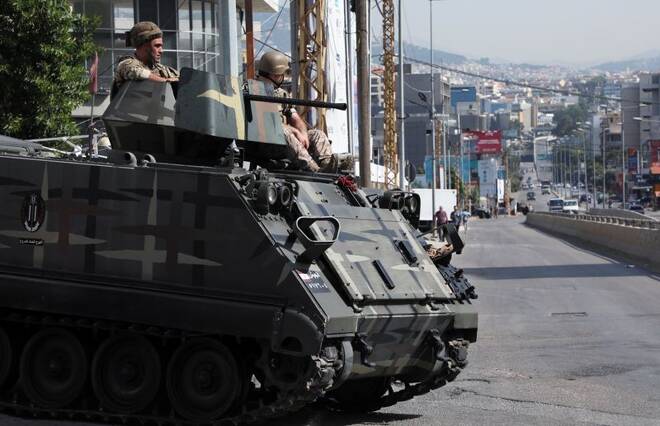Advertisement
Advertisement
Lebanon’s Bitar wages uphill struggle for justice over port blast
By:
By Laila Bassam, Timour Azhari and Maya Gebeily
By Laila Bassam, Timour Azhari and Maya Gebeily
BEIRUT (Reuters) – For Lebanese desperate to see accountability over the catastrophic Beirut port explosion, investigator Judge Tarek Bitar symbolizes hope that justice may one day be served in a country where impunity has long been the norm.
For some of Lebanon’s top officials, he is a thorn in the side whose unrelenting efforts to prosecute them over the explosion threaten a system designed to shield the ruling elite from scrutiny.
Bitar, 49, stunned Lebanon on Monday when he restarted his investigation and issued charges against current and former senior officials, defying pushback from the top echelons of the elite including the Iranian-backed Hezbollah group.
It gave new hope to those still mourning the 220 people killed in the blast, even as the prosecutor general – one of the officials charged by Bitar – told him his probe remained suspended, suggesting renewed resistance from the top.
“This is really bold and courageous. He tried this before and it didn’t work. There is no support among the political figures. You feel like he’s on a solo mission,” Tania Daou-Alam, who lost her husband in the blast, told Reuters.
Bitar’s determination, she added, made him something of a “modern-day hero”.
The explosion in August 2020, one of the largest non-nuclear blasts on record, was caused by hundreds of tonnes of ammonium nitrate unloaded at the port in 2013.
To many Lebanese, the disaster symbolised the wider corruption and mismanagement of a ruling elite that had also steered Lebanon into a devastating financial collapse.
At the time, leaders promised the truth within days. But more than two years later, nobody has been held to account in a country where the judiciary is prone to political influence, with many judicial appointments determined by politicians.
Bitar was appointed to head the probe in 2021 after his predecessor – Judge Fadi Sawan – was removed from the inquiry in response to complaints from top officials he had charged over the explosion.
Bitar went on to file his own charges against several top politicians, including former ministers allied to Hezbollah. But they refused to be interrogated, denying wrongdoing and saying he had overstepped his powers.
His probe was ordered frozen roughly a year ago when judges retired from a court that must rule on the complaints against him. The authorities have yet to appoint replacements, prompting fears of an indefinite limbo.
“It became clear that the real issue is that no one wants him to continue”, said lawyer Nizar Saghieh of NGO Legal Agenda.
“He did a necessary or urgent interpretation… driven by the necessity of doing something to end this impunity system.”
‘SACRED’ CASE
Bitar is not allowed to make public statements, but in one rare interview in 2021 described the case as “sacred”. “I will go wherever the law leads me. Nothing will stop me,” he told L’Orient le Jour.
The heavily-armed Hezbollah, Lebanon’s strongest faction, has accused him of bias and Washington of meddling in the probe – a claim denied by the U.S. ambassador.
In 2021, a Hezbollah official sent a message to Bitar vowing to “uproot” him and supporters of the group and its allies marched in a rally against him that prompted deadly violence in Beirut.
Bitar’s detractors heaped criticism on him.
Al-Akhbar, a pro-Hezbollah newspaper, declared Bitar had “gone mad”. Wiam Wahhab, a Hezbollah allied politician, called for his expulsion from the judiciary and called him a liar.
Bitar, a devout Catholic from Akkar region of the north, has charged officials from across the sectarian spectrum including Shi’ites, Sunnis and Christians.
All those charged by Bitar and Sawan have denied wrongdoing.
Mustafa Ibrahim, the former major of Bitar’s village, said he was not surprised by his determination.
“He will follow up until the end. He knows something big happened and all of those with a hand in it must face trial,” he said. “I said from the start ‘the right person is in the right place’,” he added, describing Bitar as just with no political affiliations.
A colleague of Bitar who declined to be named because he is a serving official said he was “tough, but always follows the law”. “He does not do many social events or visits, and certainly not to any politicians.”
Reuters reported after the blast that security officials had warned Prime Minister Hassan Diab and President Michel Aoun in July 2020 that the ammonium nitrate posed a security risk and could destroy the capital if it exploded.
A 2021 Human Rights Watch report said high-level security and government officials “foresaw the significant threat to life … and tacitly accepted the risk of deaths occurring”.
William Noun, who lost his brother in the blast, said of Bitar’s move: “This is very much a judicial uprising”.
(Reporting by Laila Bassam, Timour Azhari, Maya Gebeily; Writing by Tom Perry, Editing by William Maclean)
About the Author
Reuterscontributor
Reuters, the news and media division of Thomson Reuters, is the world’s largest international multimedia news provider reaching more than one billion people every day. Reuters provides trusted business, financial, national, and international news to professionals via Thomson Reuters desktops, the world's media organizations, and directly to consumers at Reuters.com and via Reuters TV. Learn more about Thomson Reuters products:
Advertisement
